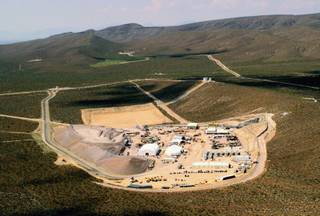Sun Topics
Sun Archives
- President's course leaves question open: Is it dead? (5-24-2009)
- In Obama's budget, money to fight Yucca also likely cut (5-20-2009)
- Dumped on (5-15-2009)
- Obama names ex-Reid aide to lead nuclear commission (5-13-2009)
- State can argue 222 claims against Yucca (5-11-2009)
- Bell tolls for Yucca (5-8-2009)
- Obama plans lean Yucca budget (5-6-2009)
Sun Coverage
Sun Blogs
The House lawmakers who appropriate money for energy needs were not pleased as Energy Secretary Steven Chu appeared before them Wednesday.
The legislators have approved spending hundreds of millions of dollars annually for the proposed nuclear waste repository at Yucca Mountain. Chu arrived to present the Energy Department’s annual budget request, which, it was widely known, had only minimal funds for the project. President Barack Obama is terminating the planned dump northwest of Las Vegas.
Disappointment ran deep among committee members, as did frustration and outrage. More than $9 billion has been spent developing the waste dump, which Nevada opposes.
“We got a mighty expensive dinosaur out there,” Arkansas Democratic Rep. Marion Berry said in his southerly deep drawl.
“It seems an awful shame to me we spent that money,” Berry went on. “I know folks in Nevada don’t like it, but sometimes things happen in Arkansas that I don’t like.”
Republican Rep. Mike Simpson of Idaho wanted to know the hard facts.
“Is Yucca Mountain, as a permanent geological repository, dead?” Simpson said.
Chu easily fielded that one.
“Yes.”
Simpson said he had learned long ago in politics “it doesn’t do much good to howl at the moon.” Yet he pressed on. What now?
The Energy Department is forming a committee to consider alternatives. Chu explained that science has progressed in the nearly 30 years since the country began seriously considering what to do with spent nuclear fuel.
Chu envisions different classes of nuclear waste storage, some more readily retrievable for recycling, if a technology can be developed that does not create a stream of plutonium that could be used to enrich nuclear weapons.
A permanent repository then would be just that — a site, unlike Yucca, where the waste would be not be touched again.
Simpson wanted to know if the commission could end up designating Yucca Mountain, “the most studied piece of earth in the world,” as the permanent site. The issue is important in Simpson’s home state of Idaho, which is holding nuclear fuel that is among a small amount of defense industry waste once planned for Yucca Mountain.
“I think Yucca Mountain as a long-term repository is definitely off the table,” the energy secretary replied.
Simpson saw where this was headed. “So this opens up all the sites that were looked at before — before Yucca Mountain was chosen — as well as any others, as potential permanent repositories?”
Chu explained that if the material is to be truly inaccessible, “then other sites become actually more desirable.”
“It becomes a different question,” he said.
Simpson marveled at the comment. “I find it amazing that the committee’s going to look at a geologic repository but the one geologic repository we’re not going to look at … is Yucca Mountain.
“To me it’s more politics than science.”
Scenes similar to this one have taken place in other committee rooms on Capitol Hill in recent months as it has become increasingly clear that Yucca’s days may truly be numbered. Lawmakers, particularly from states with stockpiles of used fuel sitting at nuclear power plants, have to answer to constituents who have been paying to develop Yucca Mountain.
As if salting the wound, Chu had come before them for the same reason that past energy officials come calling every year. He needed money. Even a dead program costs. The Energy Department is requesting another $196.8 million for the end of Yucca.


Join the Discussion:
Check this out for a full explanation of our conversion to the LiveFyre commenting system and instructions on how to sign up for an account.
Full comments policy